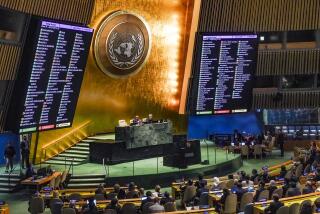U.N. Calls for Restoring Sports, Cultural Ties With S. Africa
- Share via
UNITED NATIONS — The U.N. General Assembly, citing progress toward ending apartheid, called unanimously Friday for the restoration of international sporting, cultural, scientific and academic ties with South Africa.
The assembly, in its annual resolution on apartheid, also encouraged countries to review and lift remaining economic sanctions as South Africa creates a new transitional multiracial government and drafts a democratic, non-racial constitution.
The assembly’s move ended a decades-long call for a sports and cultural boycott of South Africa because of its racial laws. Friday’s resolution was adopted by consensus, without a vote.
Although the boycott resolution had no enforcement provisions, the U.N. Secretariat annually published lists of athletes, film stars, musicians and other performers who traveled to appear in South Africa, embarrassing some into pledging not to return.
Many organizations and governments already have lifted their sports boycott of South Africa. The country was readmitted by the International Olympic Committee this past summer and the ATP Tour doubles championships were held in South Africa in November.
As a U.N. member, the United States adhered to the U.N. limits on sports and cultural links with South Africa. Congress lifted some U.S. economic sanctions against South Africa earlier this year, but some remain in place, to be eased in line with political progress.
The United States never supported a formal international boycott of exchanges. It restricted the mostly economic exchanges prohibited under U.S. sanctions law but otherwise left it to individual citizens to decide.
During Friday’s General Assembly session, the South African seats in the assembly hall were empty. South Africa’s voting rights were suspended in 1974 for the country’s defiance of U.N. resolutions calling for racial equality.
The resolution comes as the white-dominated government, African National Congress and other anti-apartheid groups prepare to begin a constitutional conference Dec. 20 to lay the groundwork for a non-racial, democratic political system in South Africa.
More to Read
Sign up for Essential California
The most important California stories and recommendations in your inbox every morning.
You may occasionally receive promotional content from the Los Angeles Times.










